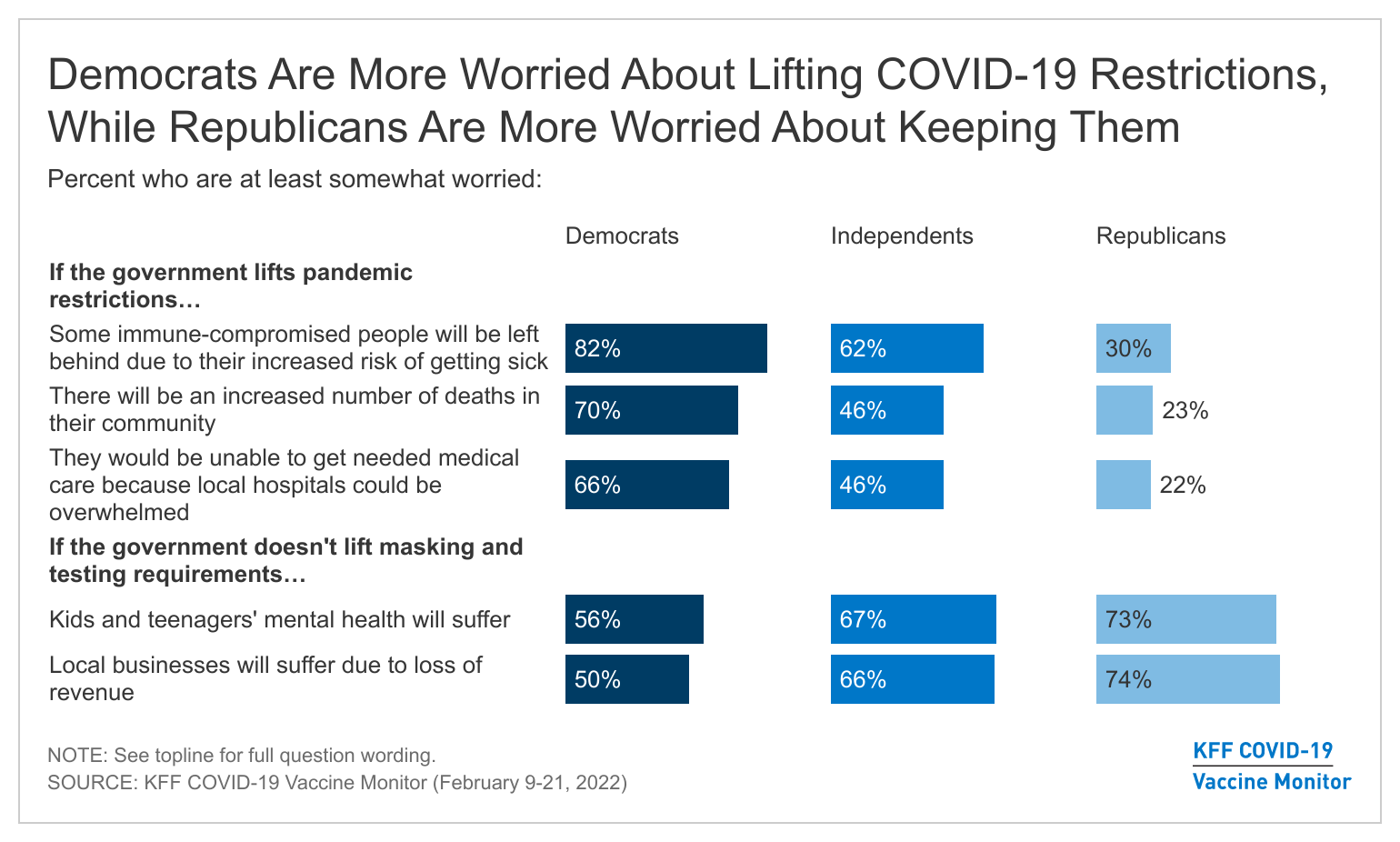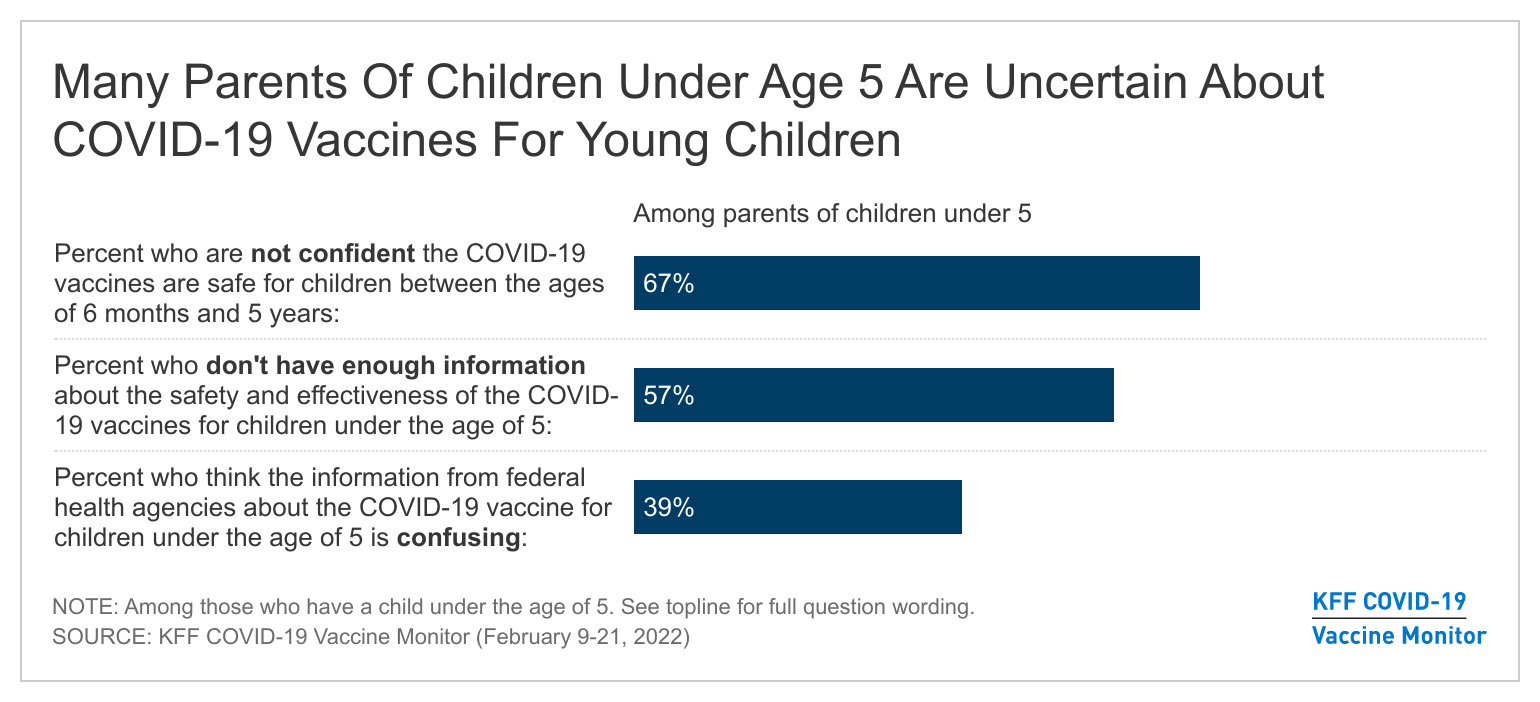
The independent source for health policy research, polling, and news.
Large Shares of the Public Worry about the Consequences of Both Ending and Keeping COVID-19 Restrictions, with Partisans Largely Split on Which Direction is Most Concerning
The Pandemic Isn’t a Top Issue for Voters Eight Months Ahead of the Midterm Elections
As federal, state, and local authorities move to roll back COVID-19 restrictions, a new KFF COVID-19 Vaccine Monitor survey finds many people ready to get back to normal but a public also nervous about the potential consequences. Large shares of the public are worried about the implications of both keeping and easing pandemic restrictions – with partisans split on which direction worries them the most.
Overall, majorities say they worry about the potential consequences of keeping restrictions on the mental health of kids and teenagers (65%) and local businesses’ revenue (63%). At the same time, most (61%) say that they worry that lifting restrictions will put immune-compromised people at increased risk of getting sick, and nearly half worry that it could lead to more deaths in their communities (49%) or people being unable to get needed medical care due to overwhelmed hospitals (48%).
Democrats are far more likely than Republicans to worry about the consequences of lifting restrictions on immune-compromised people (82% v. 30%), deaths in their community (70% v. 23%), and overwhelmed hospitals (66% v. 22%), while more Republicans than Democrats worry about the impact of not lifting restrictions on teenagers and children (73% v. 56%) and on local businesses (74% v. 50%).

That divide highlights the realities facing federal, state and local officials as they seek to balance public-health needs with the conflicting concerns worrying different constituencies as COVID-19 cases and deaths fall following the omicron variant surge.
“The conventional wisdom seems to be that Americans are ready to throw off all COVID restrictions and be done with it, but the survey shows that reality is much more complicated,” KFF President and CEO Drew Altman said. “Much of the public is sensibly both anxious and eager about returning to normal.”
Overall, about half (49%) of the public expects it will be safe for most people to resume normal pre-pandemic activities by late spring, including a third (35%) who say it is already safe to do so. Smaller shares expect it will be safe by mid-summer (13%) or mid-fall (5%), while a quarter (26%) say it will be at least another year before it will be safe for most people to resume pre-pandemic activities.
Republicans (65%) and unvaccinated adults (60%) are far more likely to say that it is safe to resume normal activities now than are Democrats (11%), independents (38%) and vaccinated adults (26%). Three quarters (78%) of the public – including substantial majorities across partisan groups, age, and vaccination status – expect normal life to look different going forward than it did before the pandemic.
When asked to say in their own words how normal life would be different, about 1 in 5 cite continuing to wear masks (18%) and being more cautious in their daily lives (18%). About 1 in 10 cite changes in the way we work (11%), social distancing or avoiding crowds (11%), and that everything will be different or that the current situation is the new normal (9%).
Economy/Inflation Is Voters’ Top Issue with Midterm Elections Looming, with Pandemic Well Behind
While the COVID-19 pandemic still looms large for many people in the U.S., it is not looking like it will be a top issue for voters as they begin to think about the 2022 midterm elections.
Eight months ahead of the midterm elections, voters are focusing on other issues with large majorities saying the economy and inflation (91%), voting rights (84%), foreign policy (83%), health care costs (82%), and immigration (79%) will be at least somewhat important to their vote. The pandemic ranks lower with 69% saying it will be at least somewhat important to their vote, similar to the share who cite abortion as an important voting issue (71%). (The survey was fielded just prior to Russia’s invasion of Ukraine.)
Looking at the issues that partisan voters rate as “very” important, the economy and inflation is the top issue for Republicans (86%), while Democrats most often cite voting rights as “very important” (81%). The pandemic does not rank among the top four issues that voters in any partisan group say is going to be “very important” to their vote.
When asked about President Biden’s actions during the pandemic, similar shares of voters say he deserves more credit for helping the country through the pandemic (46%) and that he deserves more blame for hurting the country during the pandemic (41%). Democratic voters overwhelming give President Biden more credit (85%), while Republican voters overwhelmingly give him more blame (80%). Independent voters are more evenly split (41% more credit, 43% more blame).
Parents of Young Children Show Concern and Confusion About Potential Vaccine Authorization
Amid a delay in the expected authorization of a COVID-19 vaccine for children under age 5, the latest survey shows that most (57%) parents with children in that age range say they don’t have enough information about the safety and effectiveness of a vaccine for those children.
At this point, prior to federal approval of any COVID-19 vaccine for children under age 5, around two thirds (67%) of parents of children under 5 say that they are “not too confident” or “not at all confident” that the vaccines are safe for children in that age group. In addition, 39% of those parents say that the information from federal health agencies on the subject is confusing.

Reflecting those concerns, about 1 in 5 (21%) parents of children under age 5 say that they plan to get their child a COVID-19 vaccine right away once it is authorized for their age group. A quarter (26%) say they want to wait and see how it works for other young children before getting their child vaccinated, 15% say they would only get them vaccinated if required.
Parents Are Divided on Mask Requirements in Schools
With many schools around the country easing mask requirements and other restrictions, the new report shows parents are roughly split on the issue: 43% say that schools should require masks for all students and staff; 9% say they should require masks only for unvaccinated students and staff; and 46% say they should not have any mask requirements at all. That reflects falling support for masks in schools since September, when two thirds of the public and more than 6 in 10 parents favored some level of mask requirements.
Most parents say that schools should not require that students and staff get a COVID-19 vaccine, including majorities of parents with teens ages 12-17 (58%), children ages 5-11 (66%), and children under age 5 (59%). The public overall is divided on the issue, with similar shares saying schools should (46%) and should not (51%) require vaccines. Most Democrats (76%) favor a vaccine requirement in schools, while most Republicans (84%) and independents (56%) oppose one.
Three Quarters of Those Likely Eligible for a Booster Shot Report Having Gotten One
The latest report shows nearly half (47%) of all adults report having gotten a booster dose of a COVID-19 vaccine. This includes three quarters (75%) of those likely to be eligible for a booster shot because they completed their full initial vaccination at least six months ago.
Black adults (41%) and Hispanic adults (39%) continue to lag behind White adults (52%) in the share who have gotten a booster dose of a COVID-19 vaccine. These population groups were also some of the later groups to receive an initial vaccination and therefore, larger shares of them are not yet eligible for a booster dose. However, White adults (79%) continue to outpace Black adults (67%) and, to a lesser degree, Hispanic adults (69%), even among those likely eligible for a shot.
Designed and analyzed by public opinion researchers at KFF, the Vaccine Monitor survey was conducted from February 9-21, 2022 among a nationally representative random digit dial telephone sample of 1,502 adults. Interviews were conducted in English and Spanish by landline (172) and cell phone (1,330). The margin of sampling error is plus or minus 3 percentage points for the full sample. For results based on subgroups, the margin of sampling error may be higher.
The KFF COVID-19 Vaccine Monitor is an ongoing research project tracking the public’s attitudes and experiences with COVID-19 vaccinations. Using a combination of surveys and qualitative research, this project tracks the dynamic nature of public opinion as vaccine development and distribution unfold, including vaccine confidence and hesitancy, trusted messengers, and messages, as well as the public’s experiences with vaccination.